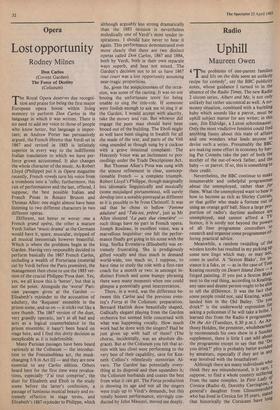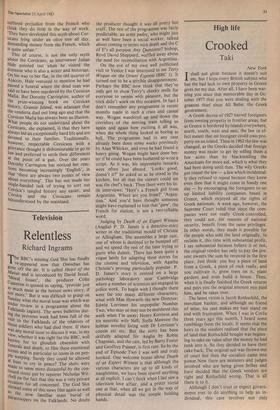Radio
Uphill
Maureen Owen
The problems of one-parent families 1 and life on the dole seem an unlikely recipe for comedy', say the BBC publicity notes, whose guidance I turned to in the absence of the Radio Times. The new Radio 2 sitcom series, Albert and Me, is not only unlikely but rather uncomical as well. A no- money situation, combined with a burbling baby which sounds like a parrot, must be uphill subject matter for any writer; in this case, Jim Eldridge, a Luton schoolmaster. Only the most vindictive feminist could find anything funny about this state of affairs and one wonders what leads anyone to devise such a series. Presumably the BBC are making some effort in economy by hav- ing Pat Coombs take the part of both the mother of the out-of-work father, and the baby — or parrot. If so, this is something to their credit.
Nevertheless, the BBC continue to make innumerable and unhelpful programmes about the unemployed, rather than for them. What the unemployed want to hear is how to become as rich as Shirley Conran, or that golfer who made a fortune out of using an orange golf ball. Since a large pro- portion of radio's daytime audience are unemployed, and cannot afford a TV licence, it is surely not beyond the powers of all four programme controllers to research and organise some programmes of- fering practical advice. Meanwhile, a random twiddling of the wireless knobs has resulted in my picking up some new lingo which may, or may not' come in useful. A 'Sexton Blake', for In- stance is a fake, or — as in the case of Torn Keating recently on Desert Island Discs — a forged painting. If you put a Sexton Blake next to the real thing, according to Keating. any sane and decent person ought to be able to tell the difference. It was the fact that some people could not, said Keating, which landed him in the Old Bailey. 'Do You drink?' is the underworld expression for, asking a policeman if he will take a bribe. i learned this from the Radio 4 prograntroe' On the Air (Tuesdays, 6.30 p.m.). As An- thony Holden, the presenter, wholehearted- ly recommends his own show in a Sunday supplement, there is little I can add about the programme except to say that the :0°, you drink?' ploy is probably better avoided by amateurs, especially if they are in any way involved with the breathalyser. Although there are many individuals who think they are misunderstood, it is rare, ,. suppose, to find a whole country suffering, from the same complex. In First Lady (e Corsica (Radio 4), Dorothy Carrington, _ general's daughter from Gloucestershire who has lived in Corsica for 35 years, stated that historically the Corsicans have long suffered prejudice from the French who think they do little in the way of work. 'They have developed this myth about Cor- sicans lying under an olive tree all day, demanding money from the French, which is quite unfair.' This of course, is not the only myth about the Corsicans, as interviewer Julian Hale pointed out when he visited the doyenne who is also a writer and historian. On his way to her flat, in the old quarter of Ajaccio, Hale ventured to mention he had Passed a funeral where the dead man was said to have been murdered by the Corsican Mafia. But Dorothy Carrington, author of the prize-winning book on Corsican history, Granite Island, was adamant that the vendetta died out long ago and that the Corsican Mafia has always been an illusion. What people do not understand about the Corsicans, she explained, is that they have always led an exceptionally hard life and are devoted to their families. Traditionally, however, respectable Corsicans with a grievance thought it dishonourable to go to law and preferred to settle their differences at the point of a gun. Over the years Dorothy Carrington has noticed her reac- tions becoming increasingly 'English', in that 'there are always two points of view about everything'. This has not made her single-handed task of trying to sort out Corsica's tangled history any easier, and Corsica and the Corsicans remain misunderstood by the mainland.











































 Previous page
Previous page